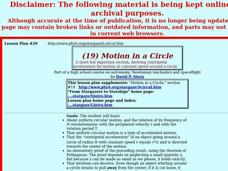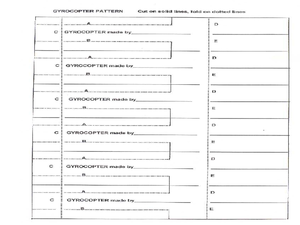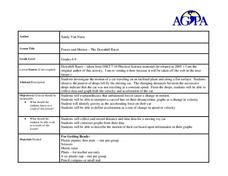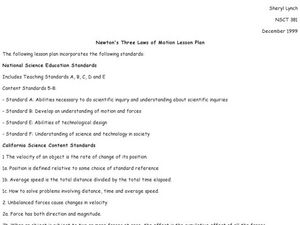NASA
Two Versions of Gravity: Newton and Einstein
We have all heard the debate about teaching both theories, but an innovative activity takes the discussion to a new level. Scholars research and debate Newton's Law of Gravitation versus Einstein's General Theory of Relativity with...
Curated OER
Simple Harmonic Motion with Dr. DAQ
Students study the work and accomplishment of Galileo. In this physics lesson, students calculate the period of a pendulum's using a mathematical equation. They explain the different factors affecting its period.
Curated OER
Understanding Chemical and Physical Reactions
For this chemical and physical reactions worksheet, students read a 2 page science article, answer 10 statements as true or false, give 2 ways a chemical reaction is different from a physical reaction, answer 1 short answer question and...
Curated OER
MOTION IN A CIRCLE
Students explore uniform circular motion, and the relation of its frequency of N revolutions/sec with the peripheral velocity v and with the rotation period T, and the "centripetal acceleration" of an object.
Curated OER
Rocket Science 101
Students explore the aspects of Newton's First and Third Laws of Motion as they conduct controlled rocketry experiments and analyze the Mars Mission in terms of the principles of rocketry.
Curated OER
Science Quick Vocabulary Review Worksheet
In this science worksheet, learners read 15 science definitions and determine which science vocabulary word fits each definition. Students write their answers in the box that precedes each definition.
Curated OER
Super-Ball Physics
Students experiment with varied balls to determine the bounce factor in centimeters. For this physics lesson, students experiment to find the height a ball must be dropped from the have the highest bounce rate. Students graph the results...
Curated OER
Science Multiple Choice Words Worksheets
In this science worksheet, students choose the multiple choice science term that best matches the 15 definitions stated. Students circle their answers.
Curated OER
Gyrocopters-Producing Rotary Motion
Students demonstrate rotary motion by practicing with gyrocopters. In this physics lesson students work in groups to construct a gyrocopter and explore how physics effect it torque and inertia.
Curated OER
Motions and Forces
Young scholars explore motions, forces and magnetism. They investigate magnetism as a force and examine the construction of a magnet. Students examine the force that magnetism produces.
Curated OER
Gravity (Newton's Laws of Motion): A Weighty Subject
Students identify Newton's Laws of Motion. They students explore Newton's Laws of Motion and apply the second law with a classroom activity. The videos will provide visual examples of the effects of gravity while riding on a roller coaster.
Curated OER
What Does Motion Have to do with Sound?
Second graders investigate and explore sound energy. They investigate how the vibrational motion moves through matter in waves. Students describe sounds and vibrations. They observe that vibrational motion creates sounds. Students record...
Curated OER
Describing the Motion of a Battery Powered Cars
Students explore distance a toy car travels by changing the amount of batteries used to power the toy car. In this force and motion lesson plan, students calculate the average speed of a car while investigating the power from various...
Curated OER
Forces and Motion-The Downhill Racer
Students calculate a toy car's velocity and acceleration. In this force and motion instructional activity, students build ramps and attach a dropper to a toy car, which is released down the ramp. Students calculate and graph velocity and...
Curated OER
Projectile Motion II
Students explore projectile motion and kinematics in two dimensions. They determine, using an adjustable projectile launcher, what angle makes a projectile go the highest.
Curated OER
Punting and Projectile Motion
Young scholars explore the concept of projectile motion. For this physics lesson, students watch the video "Science of NFL Football – Projectile Motion and Parabolas." Young scholars participate in computer simulations on the range of...
Curated OER
Was Kepler Correct?
Learners are introduced to Kepler's 2nd law of Planetary Motion. The lesson reinforces the understanding of focal points. They calculate the sector area of an ellipse.Students expand understanding by modeling Kepler's 2nd Law of...
Teach Engineering
A Shot Under Pressure
You've got to pump it up! Using the equations for projectile motion and Bernoulli's Principle, class members calculate the water pressure in a water gun. The pupils collect data on the number of pumps and distance traveled in order to...
Curated OER
Typical Conceptual Questions for Physics I - Heat
This worksheet would make a nifty quiz on the laws of thermodynamics. Nine multiple choice questions assess high schoolers' understanding of energy transfer, specific heat capacity, phase change, fusion, and vaporization. It is short but...
Curated OER
Sciences Working Together
Students research articles about science technology and society. In this science and technology lesson, students answer questions about an article they chose. They share what they learned with their peers.
Curated OER
Laws of Motions
Seventh graders explore the Laws of Motion. They define friction and explain the concept of inertia. Students explain what happens when a force is exerted on an object that is in equilibrium. They state the second and third laws of motion.
Curated OER
Newton's Three Laws of Motion Lesson Plan
Students explore Newton's three laws of motion using a variety of activities. In this physics lesson, students calculate the average speed of a vehicle they constructed using distance and time information. They identify and draw the...
Curated OER
Physics: Force and Motion
Learners use the internet to discover the basic concepts in physics. They complete interactive simulations where variables can be changed. They answer comprehension questions to end the lesson.
Curated OER
Motion on an Inclined Plane
In this physics worksheet, students model the acceleration, velocity, and position of a cart moving up an inclined plane. They take data and determine a pattern in the data. Students also describe their findings and create an illustration.

























